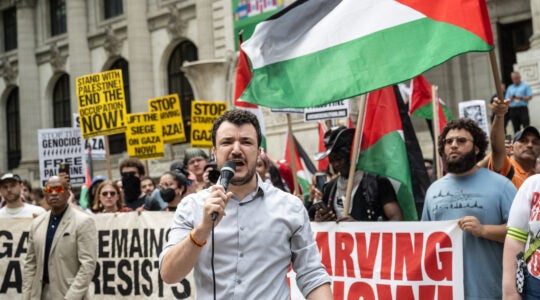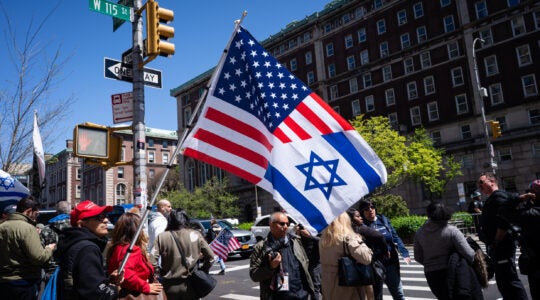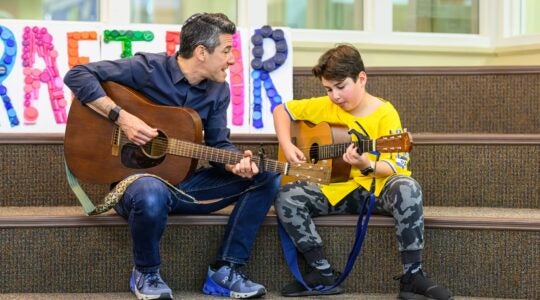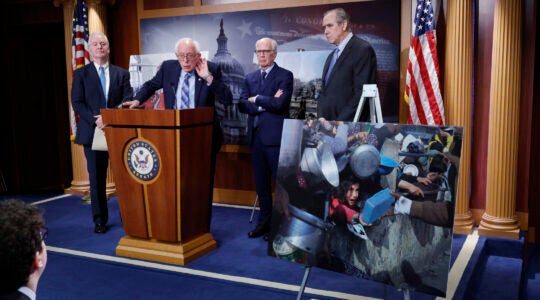Editor’s Note: An earlier version of this story stated that students at the University of Rochester “occupied” a campus building. The university says that students followed standard procedures in preparing for the event.
NEW YORK (JTA) — At York University in Toronto, a group of students had to be escorted from the Hillel office by campus police on Feb. 11 after a threatening mob shouting anti-Semitic and anti-Israel slogans gathered outside.
At New York University, a group of students occupied a campus building and issued a series of demands that included measures supportive of the Palestinians. Similar demands were issued by students during a demonstration at the University of Rochester.
And at San Jose State University in California, Israel’s consul general had to be escorted from a lecture hall by security officials after audience members grew agitated.
These are a few of the incidents that have galvanized Jewish organizations that say the climate on campus is unlike anything they have ever seen. The organizations note particularly the physical threats to and intimidation of Jewish and pro-Israel students.
“Jewish students are not comfortable and they’re not feeling secure,” Daniel Ferman, president of the York Hillel, told JTA. “But I think most importantly though, they’re not happy with the situation. I think they’re disappointed that there hasn’t been more action. The university administration needs to take responsibility for its campus and ensure that it’s a safe environment for all students.”
Compared to the animus frequently directed toward Israelis in Europe, where calls for academic and cultural boycotts have become routine and even sports competitions involving Israelis attract scores of rock-throwing protesters — the situation at American campuses is relatively tame. But those involved in pro-Israel activism at U.S. colleges remain concerned that the situation is worsening, with rhetoric and tactics once thought rare in North America gaining increasing traction.
“The level of activity and nature of activity in three specific areas is measurably different in kind, not merely degree, from what we’ve seen before,” said Wayne Firestone, president of Hillel: The Foundation for Jewish Campus Life.
Firestone said the three areas are academic hostility toward Israel, physical intimidation, and activities similar or related to Israel Apartheid Week, the annual weeklong festival of anti-Israel events that just finished its fifth year.
“There are a couple of things that make this rise unique and worrisome in my eyes,” said David Harris, director of the Israel on Campus Coalition, a partnership featuring nearly three dozen Jewish organizations. “One is that we’re seeing anti-Israel activity on campuses like Cornell and Queens College that have not for years seen meaningful anti-Israel activity.”
A second trend Harris noted is “confrontational and physically harassing tactics in campus and the spread of uncivil dialogue on the West Coast and moving eastward.”
California campuses have long been a source of concern for the pro-Israel community.
At the University of California, Irvine, pro-Israel students have accused the administration of being unresponsive to acts of physical harassment and intimidation. The Zionist Organization of America offered complaints on their behalf to the U.S. Department of Education.
The University of California, Berkeley, with its storied history of campus political activism, also has been a hotbed of anti-Israel agitation.
“It’s not just about Israel, it’s just about Judaism in general a lot of the time,” said John Moghtader, 21, a Cal junior from Los Altos, Calif., and the president of Tikvah, a pro-Israel student group.
In February, Moghtader was the the target of a rare and highly controversial vote to determine if he should be recalled from his student Senate seat. The recall, which reportedly cost the Associated Students of the University of California $25,000, was described by the editorial board of the student newspaper as “a politically motivated effort that, if successful, would set a dangerous precedent for the student government.”
Supporters of the recall countered that campus police recommended Moghtader be charged with a hate crime after a November incident in which he allegedly assaulted several pro-Palestinian students, an allegation he denies. Preliminary results show the recall proposition passed by a comfortable margin.
Moghtader told JTA that his friends who wear yarmulkes “don’t feel safe.”
“They get glared at by people in [Students for Justice in Palestine] who know who whey are,” he said. “It’s not a comfortable atmosphere. If you’re a Jew who supports Israel at all, you’re setting yourself up for an extreme amount of hostility.”
The campus situation has caught the attention of a number of Jewish groups. The David Project for Jewish Leadership, the Anti-Defamation League, Stand With Us, the Simon Wiesenthal Center and Hillel have launched separate efforts to support Jewish students and counter pro-Palestinian activity on campus.
Most of the efforts focus on providing educational materials and other resources to enable Jewish students to counter the anti-Israel messaging.
The David Project has trained student leaders and activists, helped organize speakers and panel discussions, and dispatched campus coordinators to assist students in responding to pro-Palestinian activity. The Israel on Campus Coalition, which was founded in 2002 to respond to the rise in anti-Israel activities following the outbreak of the second intifada, prefers a similarly non-confrontational approach, focusing on positive messaging about Israel.
Harris pointed to a “terrific innovative example” at the University of Florida in which a student organized a technology garden, in partnership with several campus groups and supported with a coalition grant, that showcased Israeli contributions to desert agriculture.
But Jon Loew, the founder of the pro-Israel Fuel For Truth, which operates extensively on campus through its Old Skool program, said the nature and volume of the requests his group receives demands a more aggressive response.
“Jews on campus are going to continue to be picked on until the Jews on campus give them a reason to think twice about picking on them,” Loew said. “The aggressive protests that are being organized by our enemies need to be met with an equal or greater response from our side. I’d like to see an alternative suggestion by any other member of our community.”
Following the incident at the Hillel office at York, Firestone wrote to the university president, Mamdouh Shoukri, asking him to take disciplinary action against the students involved and ensure the safety of the Hillel office. Shoukri has not responded to the letter, but the university has fined Hillel and another pro-Israel group, Hasbara Fellowship, for disrupting classes during a rally held the day after the incident at the Hillel office.
In general, Firestone said, university administrations generally understand the situation.
“I think, as a general matter, this is an issue that at least in the U.S., that university presidents get,” Firestone said. “They can make mistakes. Nobody can anticipate in advance somebody doing something unpredictable or the like. But I think that the universities are going to need to watch in a way that they haven’t watched in the past if these types of activities continue.”
Anna Kolodner, the David Project executive director, said that university administrations are not enforcing their policies on civil discourse.
“In many cases they’ve been silent,” Kolodner said. “They are not adhering to their own policies about protecting students.
“I think the situation is getting out of hand. I think very soon we’re going to see physical activity unlike we’ve seen before.”
JTA has documented Jewish history in real-time for over a century. Keep our journalism strong by joining us in supporting independent, award-winning reporting.





